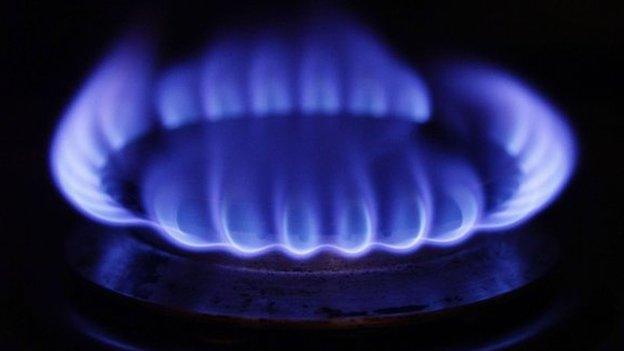Ofgem energy shake-up 'doesn't go far enough'
- Published

Ofgem's proposals to shake up the energy market put "too much onus" on the customer and "do not go far enough", says one energy company boss.
The energy regulator said four million pre-pay customers would be protected by an interim price cap from next April.
It added it would work with suppliers to help "disengaged" customers to search for cheaper deals.
But First Utility's managing director, Ed Kamm, told the BBC the plans were in danger of helping the wrong people.
"Ofgem itself admits that consumers who are already engaged in the market will see the first benefits," he said.
Ofgem proposals "do not go far enough" says First Utility managing director Ed Kamm
"We are in real danger of continuing to fuel a 'tale of two markets' - helping those who already shop around and doing little to properly help those who are continuing to pay much more than they need to or should," he added.
Bring down bills
In its report published on Wednesday, Ofgem, external said the cap on pre-payment bills would save "vulnerable" households money. At the moment, these customers pay an average of £220 a year more than those on the cheapest deals.
Asima Khan, a single mother, is one such customer who was put on a pre-payment gas meter by her supplier when she went into arrears 18 months ago.
"When you are on low income and you can't afford much and then you are having to pay so much for gas, it leaves your pocket empty," she said.
"You can't eat, you can't cook, you can't feed your children. You either don't cook at home and just use the heating or you really play with everything.
"My boys are now almost professionally trained - you put the heating on 10 minutes before you have a shower and you switch it off immediately. If it's cold, that's just too bad."
Suppliers argue that pre-payment customers are currently charged more because the technology involved in the meters is more expensive, pushing up the cost.
As a result of the move to introduce a cap, the regulator said it wanted to knock an average of between £75 and £80 a year off pre-payment bills.
However, it described the price cap on pre-payment bills as "interim".
The reason for that is that smart meters, which are cheaper to install than pre-payment meters, are due to be rolled out throughout the UK by 2020.
Customers will then be able to choose to pay in advance or to pay in retrospect.
At that point, the cheaper technology involved means there should be no need for energy suppliers to charge customers more for pre-paid energy.
Ofgem also promised to co-operate with suppliers to help "disengaged" customers on "expensive standard variable tariffs" to shop around more.
It said the proposals were an "opportunity to deliver a more competitive, fairer energy market for all consumers".
It welcomed proposals published last month by the Competition and Markets Authority (CMA) aimed at reforming the energy market.

Who has a pre-pay meter?
- People in rented accommodation, where the landlord chooses a pre-payment
- People who have had trouble paying in the past or who have debts
- Owners of second homes who are renting out a property and want to be sure bills are paid
- People who choose pre-payment because it is easier and they only use what they have paid for

Ofgem chief executive Dermot Nolan said the CMA's final report was a watershed moment for both the industry and consumers and pointed the way to a "fairer and more competitive future".
"I call on energy companies and consumer groups to seize this opportunity," he said.
'More effective'
According to the CMA's two-year investigation, two-thirds of UK households were paying "over the odds" for their energy compared with those who have switched to a different tariff.
To encourage more switching, Ofgem planned to trial "more effective prompts" on customers' bills to encourage them to compare different tariffs.
However, Ofgem said it would not be capping standard variable energy tariffs.
Mr Nolan told BBC Radio 4's Today programme the CMA had decided that capping standard tariffs was not in the best interests of customers.
Instead, the CMA had proposed "a series of remedies", said Mr Nolan, adding they would make the market fairer and encourage customers to switch energy suppliers.
Ofgem believed encouraging competition was the best protection for consumers, he added, and said switching rates had increased over the last year.


Analysis: Kevin Peachey, BBC personal finance reporter
"Switch" says the regulator. "Switch" say the energy companies. "Switch" say the consumer groups. Do it and you can save £300 to £400 every year.
They have been singing from this particular hymn sheet for years.
Yet the CMA's final report, external (paragraph 100, if you're interested) says that more than a third of the 7,000 people it asked still did not realise switching was an option.
These people - delightfully referred to as "the disengaged" - tend to be on low incomes, have few qualifications, are tenants or are aged over 65, it concludes.
Unless they are on a pre-payment meter, the pensioner from Penzance and the breadline family from Bolton are to receive prompts on their bills or letters from suppliers urging them to - you guessed it - switch.
Should they automatically be put on the cheapest deal, or at least on a cheaper backstop tariff than now? Ofgem makes it clear such a system will not be introduced.

Huge challenge
Consumer organisation Which? welcomed Ofgem's report but said the regulator faced a huge challenge in implementing the proposals in a way that stimulated competition.
"The industry will need to commit to working with the regulator to ensure people get a fairer deal on their energy," added Alex Neill, director of policy and campaigns.

One of the "Big Six" energy suppliers, EDF Energy, said it supported "the implementation of the CMA's proposed remedies without delay, so that customers can continue to benefit fully from competition and innovation".
'Competitive market'
However, critics have said it is impractical for most people to check every few weeks whether they were getting the best possible deal.
"It can be difficult - people don't have the time to do these things, but unfortunately, that's the nature of a competitive market," the director of energy supply at industry body Energy UK, Audrey Gallagher, told the BBC.
"I think this industry is doing as much as it can to try and reassure consumers that they can switch. There's information about the cheapest deals available currently on every bill," she added.
- Published5 July 2016

- Published1 July 2016

- Published26 May 2015
